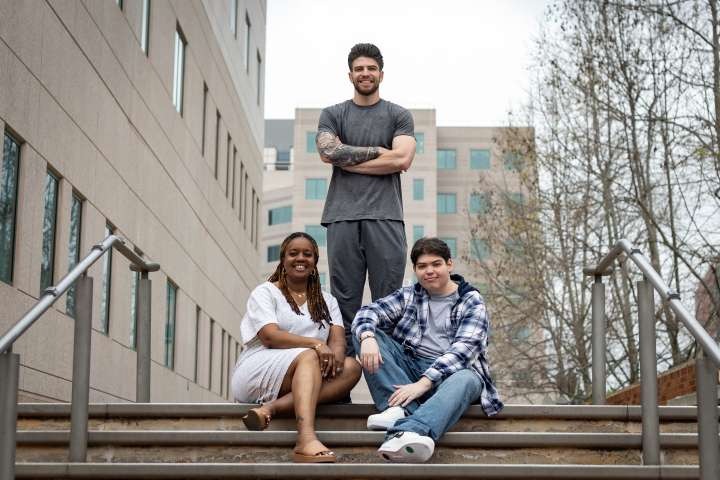
Clay Garcelli wanted to save a life by donating his kidney, he ended up saving two
- September 13, 2019
- 17 Likes
- 0 Comments
Clay Garcelli (middle) stands at the heart of Beacon Healthcare Kidney Exchange Program, flanked by Sonya Glover, his selfless recipient, and his brother Carter, who found a kidney match through the ripple effect of his brother’s generosity.
To give a kidney to someone in need is always an act of selfless generosity and kindness. But when Clay Garcelli first made the decision to help his brother by donating a kidney, he didn’t know that his choice would change the course of not one, but two lives.
Garcelli’s brother, Carter, already had received one kidney transplant. After a year, however, his body rejected the donor organ. Garcelli wanted to step in to donate a kidney to his brother, but preliminary testing determined he was not a match.
Then Garcelli learned about the Beacon Health Kidney Exchange Program, which presented him with an opportunity to help his brother — though indirectly.
Beacon Healthcare Kidney Exchange Program was designed to expand the pool of potential donors and increase access to patients in need of a transplant. In a coordinated medical swap, “I could donate my kidney to someone else, and in turn, another donor who was compatible would be able to give their kidney to my brother,” Garcelli said.
The process went smoothly, and Garcelli’s brother received a new kidney in February. “They initially thought that it would take a long time to find a match for him. I was impressed that they were able to find a kidney so quickly,” Garcelli said.
The recipient of Garcelli’s kidney, Sonya Glover, had been on the transplant waiting list for nearly a decade. Before the surgery, Garcelli and Glover were unknown to each other, but they met not long after in the hospital. A video capturing the emotional moment of their first meeting — both still wearing their hospital gowns — went viral.
“Thank you so much! Thank you! You’re such a blessing!” Glover exclaimed as she reached from her chair to embrace Garcelli when he stepped into her room.Apart from the altruism of donating a kidney to a stranger and the high level of coordination necessary to facilitate an exchange of organs among unrelated donors and recipients, there is another compelling element to this story: Garcelli is a 25-year-old white male; Glover is an older Black woman.
Kidney disease affects more than one-in-seven adults in the U.S. Black people account for 30% of patients with end-stage kidney disease, and are nearly four times as likely to develop it as white people, according to the National Institutes of Health.
Lack of access to health care, as well as industry-wide disparities in testing, means that, overall, Black people are more likely to die from kidney disease. And, like Glover, those on the list for a kidney transplant may wait longer for a new organ; the average wait for Black patients who need an organ transplant is a year longer than for white patients, according to the Association of American Medical Colleges.
Programs such as Beacon Health’s relieve the pressure on the waiting list by increasing the likelihood of successful matches for patients. Such programs are essential in a health care landscape where the number of patients in need far exceeds the number of available organs.
The kidney exchange model allows for a broader compatibility net, ensuring that even when direct family donation isn’t possible, patients can still have hope through the generosity of altruistic donors.
It is not unusual for people of differing races, like Garcelli and Glover, to be matched, as race and ethnicity are not determining factors in matching organ donors and recipients. But Jeffrey Veale, MD, director of the Beacon Kidney Exchange Program and the surgeon who performed Glover’s transplant, sees a broader message for society at large in this case.
Leave Your Comment